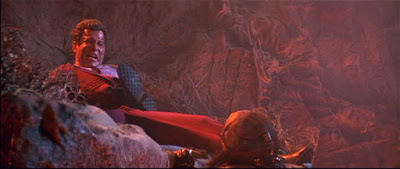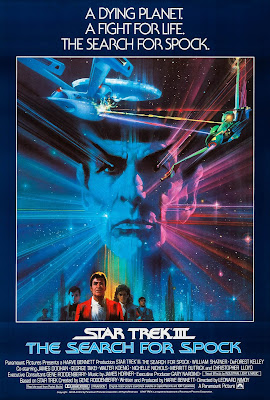Yesterday was an important day in the Christian mythology. While I myself am not a particularly religious person, I feel that it is important at least attempt to observe widespread holidays if only in order to make keywords in my videos that will hopefully ping people's Google searches and get me ad revenue.
. . .y'all know what I'm about. We had this discussion last week.
But we're not here to talk about what religions I do or don't follow or whether or not my business practices are or aren't ethical. No, instead, we're going to talk about the follow up to the (to date) greatest film in the Star Trek series. Given the monster hit that The Wrath of Khan was, one might wonder how they were possibly going to top it. I wasn't joking last week when I said the film as it is is pretty much perfection. You have a perfectly brewed revenge story, carried by a masterful performance by Ricardo Montalban. You have actual acting from William Shatner as James T. Kirk handles getting older, feeling lost with his better years behind him, and then finding that zeal for life once again.
 |
| The original cast returns, but that's old news. |
Life, death, aging, revenge... and sacrifice, as we saw with Spock, who took a lethal dose of radiation in order to save the Enterprise, allowing them to escape from the explosion of Project Genesis and the creation of a new world. A new world that, at the end of Wrath, Spock's body was shot toward in a Starfleet funeral. The camera focusing on it at the end, however (as well as Spock's narration), was a hint that the adventures were not over. In fact, they were just beginning.
We begin again with the Enterprise, limping its way back to Earth after the Battle of the Mutara Nebula. Kirk (William Shatner) narrates, speaking of an emptiness and uneasiness he feels within himself, that the Enterprise now feels to him like a house with all the children gone. This doesn't help when Doctor McCoy (DeForest Kelley) begins to act in a manner very reminiscent of a certain former First Officer of Kirk's and when, upon returning to Spacedock, Kirk is told in no uncertain terms that the Enterprise is going to be decommissioned. To make matters even worse, he is forbidden from traveling back to Genesis or even speaking of it due to the controversy that has fired up in between movies... somehow, but I'll get to that in a minute.
Elsewhere, David Marcus (Merritt Burick) and Lieutenant Saavik (Robin Curtis) was aboard the science vessel Grissom and surveying Genesis. After discovering an unidentified life form, they beam down and discover... Spock, as a child, though lacking his mind.
And finally, we have our third party, Klingons led by Commander Kruge (Christopher Lloyd), who seek the secrets of Genesis and Kruge in particular wanting them to ensure that the Federation holds nothing over his native Klingon people.
So, first off, is this film as good as Wrath of Khan? Of course not. That film is like standing on a mountain peak after a glorious climb and seeing thousands of miles stretching out before you in all directions. This film is... honestly more like part of the trip up there, but it is an enjoyable trip at that. Wrath managed to balance things well between both the personal conflicts happening between and within characters with the overall larger scope. The Search for Spock is a bit more focused on the personal conflicts with the larger scope being left in the background for a great deal of the time.
The tensions between the Federation and the Klingon Empire regarding Genesis are touched upon, but aren't really explored, which is probably for the best considering the entire thing creates a bit of a continuity error. As do David and Saavik being on another ship entirely when the movie begins when we get no real indication that all that much time has passed. I know some of the Expanded Universe of Star Trek has done some to explain that, but you aren't really made privy to any of that if you're just watching the movies.
You also don't need it, because it ultimately doesn't hurt the movie all that much to exclude that.
Kruge is a pretty spectacular villain and Christopher Lloyd plays him pretty well. Ricardo Montalban
 |
| I! Did not! Skip Leg DAY! |
playing the biblical Khan Noonien Singh casts a Hell of a shadow, which would be intimidating for any actor to try to go toe to toe with. While I don't think he quite reaches Khan's level of power and menace, he's also not trying to. Kruge isn't motivated by vengeance as Khan was, he seems to barely know or care who Kirk is in the least. His concern is in protecting the Klingon Empire from what he sees as the terroristic acts of the Federation, believing that Genesis could be used as a weapon by them.
Kruge, for better or for worse, would also set the template for a lot of what the Klingons would be going forward in the various Star Trek series. While their appearance in The Motion Picture had given them the original bumpy forehead look we all know, this was the film that start cementing the Klingon notions of honor and cunning that they would become so known for, while also retaining that same thirst for battle and conquest that the Original Series Klingons had.
This is also the first appearance of the race's language - Klingonese - as an actual language. While it had been mentioned as far back as "The Trouble With Tribbles" and we had heard some Klingon speech during The Motion Picture, this was the first time the language was actually something that had syntax and grammar and other rules applied to it. To think, too, we have James Doohan - yes, Scotty himself - partially to thank for it! Thanks, Scotty!
Also, if you want to actually learn Klingon, there are several ways of doing so including Duolingo, which offers a track to learn the language.
In many ways, The Search of Spock is the counter to Wrath of Khan's message from Spock of "The needs of the many outweigh the needs of the few". Rather than going with that, Kirk and the crew of the Enterprise decide to go the route of Screw the rules, I'm doing what's right. And, believe you me, they do it in the most glorious of ways. Hijacking the Enterprise and masterminding a valiant escape from Earth all the way back to Genesis to save Spock.
 |
| They did not, in fact, GET OUT! GET OUT OF THERE!!! |
Also, yes, this is where the tradition of blowing up the Enterprise started. In this instance, however, it was deliberately meant to be a jarring moment for the audience. The ship that Kirk and his crew had taken their five year mission on... and now it was gone, burned away into ash in the atmosphere of the planet Genesis. Nowadays, they do it just because "ooooh! Shiny explosions!", but we'll get into that in the Next Generation and the Abramsverse films.
This is also, sad to say, the last time that James Horner would compose a score for Star Trek. It's a shame and a great relief that Wrath of Khan and Search for Spock were ultimately the only two films he scored in the franchise, since I think they have most definitely made their mark. Combine his score with great performances by the cast, excellent production, some stellar directing by Leonard Nimoy, and a rather exciting story, and you have a blockbuster... and a blockbuster it was, no matter what Ronald Reagan himself might have said.
... no, really, apparently ol' Ronnie thought "it wasn't too good". Apparently, President Reagan was really good at smashing the Commies, but not so much at judging good Star Trek films. Go figure!
As I said, however, the film was a blockbuster hit - making $87 million on a budget of only $16 million, so a sequel was pretty much inevitable. The end of this film, which is not only one of my favorite endings in a Star Trek film but in any film, has Spock brought back to his friends and... the adventure continues.
 |
| "Jim... your name... is Jim." "Yes. Yes, Spock!" |
Continue it will in Star Trek IV: The Voyage Home. See you then!
Star Trek III: The Search for Spock was brought to us by Paramount Pictures.

No comments:
Post a Comment